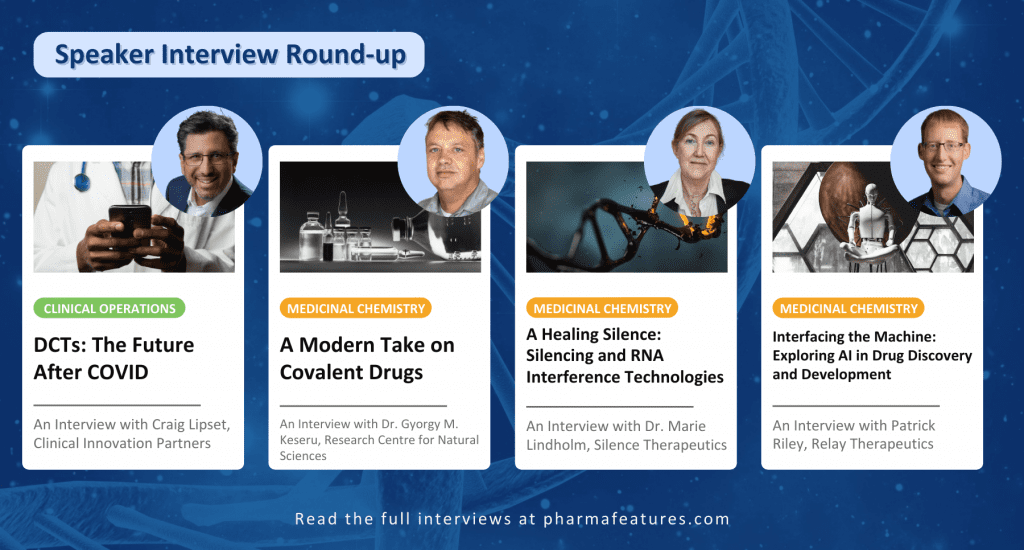Stay in sync with the latest trends in the pharma industry by following PharmaFEATURES’ weekly interview releases, featuring leading minds from cutting-edge fields in the life sciences. We aim to regularly engage with experts regarding the latest innovations and challenges facing their fields to keep you up-to-date with the newest developments in the life sciences – and to provide you with a primer on what to expect from our events. The majority of our interviewees will be facilitating innovative, bidirectional discussions in a closed roundtable format in our conferences – giving you a chance to share your own ideas, questions and form a rapport with peers from throughout the field. This February, we hosted interviews from throughout the Medicinal Chemistry field – but also Clinical Operations.
A Modern Take on Covalent Drugs, with Gyorgy M. Keseru
Many of the drugs we use every-day feature covalent binding mechanisms to their target sites. However, covalent chemical bonds tend to be long-lasting and irreversible, which makes discovering novel compounds laborious – ensuring specificity and well-rounded safety profiles can be a challenge. This is perhaps why we saw a long pause in the field of covalent drugs for much of the early 21st century, as the field was driven towards other target-driven, structure-based drug discovery approaches. The field is now witnessing a renaissance, guided by revolutionary transformations in data science and computational improvements, with big promises for its future potential. We talked to Dr. Keseru to find out more on the subject.
A Healing Silence, with Dr. Marie Lindholm from Silence Therapeutics
We caught up with Dr. Marie Wikstrom Lindholm of Silence Therapeutics to chat about the latest developments in the RNA interference (RNAi) space, including Antisense Oligonucleotides (ASOs) and short-interfering RNA (siRNA) molecules. We discussed their best applications – particularly in liver-driven conditions, and challenges that the treatment modality will need to overcome as it hopes to achieve wider adoption and marketability.
Interfacing the Machine, with Patrick Riley of Relay Therapeutics
With each transformational period in the life sciences, we see an influx of professionals from fields that were previously unrelated to our sector as we adopt novel, pioneering technologies. This is the story of Patrick Riley, a computer scientist who is now driven towards putting his tech savviness into use for improving the adoption of AI and computer science towards guiding our own drug discovery methods and a plethora of other applications in the life sciences. We caught up with him to discuss the rise of these revolutionary technologies, and the future they will bring about in the life sciences.
Catching up on DCTs with Craig Lipset, Clinical Innovation Partners
The pandemic made clear that relying solely on our traditional and highly centralized model of running clinical trials will not always be viable. While technologies to digitize and decentralize clinical investigations are not a new innovation, our interventions to stop the coronavirus and new guidelines on social distancing made their adoption a necessity. As we move past the pandemic, we expect the industry to maintain their increased use of decentralized clinical trials (DCTs) now that they have entered the mainstream – we had a quick chat with Craig Lipset over the topic.
Follow PharmaFEATURES for more leading insights directly from experts involved in the frontlines of their fields, published every Tuesday.
Nick Zoukas, Former Editor, PharmaFEATURES
Subscribe
to get our
LATEST NEWS
Related Posts

Interviews
Setting the Benchmark: Shaping Analytical Standards to Accelerate Global Convergence in Biologics Quality Systems with Stephan Krause, Bristol Myers Squibb
About the Interviewee Stephan O. Krause is the Executive Director of Cell Therapy Global Quality of Bristol Myers Squibb. Stephan O. Krause, Ph.D., serves as Executive Director for Analytical Science and Technology in Cell Therapy Quality at Bristol Myers Squibb, where he leads global analytical and quality functions supporting the development, manufacture, and regulatory advancement […]

Interviews
Harmonizing Biologics Transfer: Global Regulatory Strategy, Compliance Best Practices, and Operational Alignment with Gopi Vudathala, Incyte Corporation
About the Interviewee Gopi Vudathala is the Global Head of Regulatory Affairs and Chemistry, Manufacturing and Controls at Incyte Corporation. Gopi Vudathala, Ph.D., serves as the Global Head of Regulatory Affairs and Chemistry, Manufacturing and Controls (CMC) at Incyte Corporation, a biopharmaceutical company dedicated to the discovery, development, and commercialization of proprietary therapeutics across oncology […]

Interviews
Redefining the Analytical Frontiers of Peptide Science: Innovations Shaping the Next Generation of Therapeutics with Johan Evenäs, RG Discovery
About the Interviewee Johan Evenäs is the Chief Executive Officer at RG Discovery. Johan Evenäs, Ph.D., serves as the Chief Executive Officer of RG Discovery, a life sciences company based in Lund, Sweden, specializing in drug discovery solutions including medicinal chemistry, fragment-based lead discovery, and advanced analytical services. Dr. Evenäs holds an M.Sc. in Chemical […]

Interviews
Toward Industrial Impact: Scaling the Strategic Vision for Bioprocessing Excellence with Greg Papastoitsis, Ankyra Therapeutics
About the Interviewee Gregory Zarbis-Papastoitsis is the Chief Process and Manufacturing Officer at Ankyra Therapeutics. Gregory Zarbis-Papastoitsis, Ph.D., serves as the Chief Process and Manufacturing Officer at Ankyra Therapeutics, an immuno-oncology company advancing novel intratumoral anchored cytokines currently in Phase 1 clinical trials. Dr. Zarbis-Papastoitsis holds a B.S. and Ph.D. in Biochemistry from Binghamton University, […]
Read More Articles
Myosin’s Molecular Toggle: How Dimerization of the Globular Tail Domain Controls the Motor Function of Myo5a
Myo5a exists in either an inhibited, triangulated rest or an extended, motile activation, each conformation dictated by the interplay between the GTD and its surroundings.
Designing Better Sugar Stoppers: Engineering Selective α-Glucosidase Inhibitors via Fragment-Based Dynamic Chemistry
One of the most pressing challenges in anti-diabetic therapy is reducing the unpleasant and often debilitating gastrointestinal side effects that accompany α-amylase inhibition.












